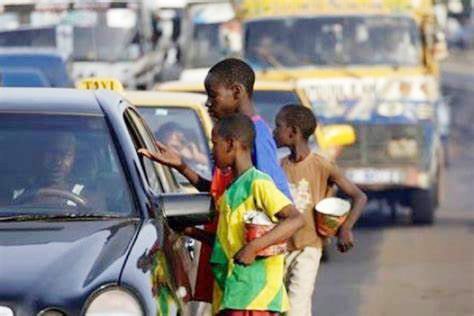By Vicky Wireko
I am learning for sure that learning is a continued process in life, no matter one’s age. Discovering and assimilating new things is part of our lives. One’s brain never shuts down on that.
So last week, I shockingly learnt something new. Something that for the life of me, I never would have thought was an issue in our statute books, much more to cross one’s mind.
How many of us, learned or otherwise, are aware that anyone who begs on the street, in a community or in any organised space commits an offence in so doing? I learnt to my chagrin on social media of all places, to be precise in a “Tik Tok” video – “Let’s Learn”, that “Begging on the street and other organised spaces, is a crime.
Really? If that is the case, then why are we under siege in some areas of the capital with beggars and their families?
Initially, when I saw the video, my instinct was that the friend who posted it was pulling a fast one on me since we were still in the “April Fool” mode. But no. It was a reality she was drawing attention to.
Aiding and Abetting
Technically speaking, we are all liable for aiding and abetting this supposed unlawfulness of giving, whether as alms or not. Giving to beggars seems to be an automatic response by many when on the road either as a driver or a passenger.
One’s faith and human instinct, a lot of the times, encourage one to give to the needy and that includes those who stand for hours or sit in the sun, begging for their daily sustenance. How can anyone say no when confronted with any such demand, especially where one could help?
Indeed, even for Christians, the Bible admonishes us to give and give generously. For example, in Luke 6:38, believers are encouraged “to give and it will be given, a good measure, pressed down, shaken together and running over will be poured into your lap.” Going further, Jesus even said, “Because you have done it for one of these, you have done it even for me” (Jesus).
The blessings one receives from giving are highlighted in Psalm 41:1 which says “Happy is the one who cares for the poor, the Lord will save him in a day of adversity.”
The Muslim faith also encourages the habit of giving to those in need, hence the various “Eid-ul-Fitr” celebrations they have on their calendar. Those faith celebrations including even Christmas, have references to giving freely and lovingly.
Amazingly, the Bible encourages believers to give, even to their enemies, reference being made of Proverbs 25:21 which says: If your enemy is hungry, give him food to eat for the Lord will reward you.”
So how come a nation with such strong faith believers can criminalise begging and giving? According to Ghanaian Law, NLCD 392, Beggar and Destitute Act – Section 2, anyone who begs on the street can be jailed for three months.
Equally liable under the same law is the one who gives to the beggar. Such a person is deemed to be aiding in the commission of the crime.
Ideal situation
Ideally, even though one would have wished that such a law was a welcome reality, it is a tough one to accept. It would have been a ready solution for a clean city. Our already dirty streets, choked with human movements, endless vehicular traffic and filth competing side by side with beggars are too much to contain.
Unfortunately, one’s natural and compassionate nature makes it difficult to just welcome it with open arms.
Some people have even made it a habit to keep loose monies in their vehicles just to be able to, in traffic, readily give to persons who spend hours in the scorching sun, sometimes with their babies strapped to their backs to beg to feed their families. To such people, they are prompted by their faith and what the good book commands them to do.
On the other hand, there are those who in society, believe that it is not every beggar one should be giving alms to. To them, they believe some of those who are begging on our streets have sinister motives while out there and the one who shows them sympathy by giving rather receive attacks in the spiritual realm.
Whatever the reason, one is learning that our statute books frown on begging. Thanks to social media, some of us now know that there is a Beggar and Destitute Act, Section 2 of NLCD 392 which bars begging and giving on the street.
This law makes it clear that while the beggar can be arrested by a police officer with a warrant and liable to conviction, the giver is deemed to be aiding in the commission of the crime.
So now we have it, ignorance is no excuse. The law is clear and whether it is outmoded or at variance with one’s faith or nature, one is committing a crime by giving on the street. According to the laws of Ghana, to have “pity” and give to someone begging for money to feed his or her family out there in the street is liable.
What does one do in this case? To give or not to give? That is a big question.





































